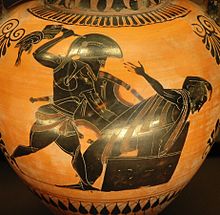Priam
Most scholars take the etymology of the name from the Luwian 𒉺𒊑𒀀𒈬𒀀 (Pa-ri-a-mu-a-, or “exceptionally courageous”),[2][3] attested as the name of a man from Zazlippa, in Kizzuwatna.
[citation needed] Priam was described by the chronicler Malalas in his account of the Chronography as "tall for the age, big, good, ruddy-colored, light-eyed, long-nosed, eyebrows meeting, keen-eyed, gray, restrained.
These children include famous mythological figures such as Hector, Paris, Helenus, Cassandra, Deiphobus, Troilus, Laodice, Polyxena, Creusa, and Polydorus.
In Book 3 of Homer's Iliad, Priam tells Helen of Troy that he once helped King Mygdon of Phrygia in a battle against the Amazons.
According to Homer in book XXIV of the Iliad, Zeus sends the god Hermes to escort King Priam, Hector's father and the ruler of Troy, into the Greek camp.
Priam begs Achilles to pity him, saying "I have endured what no one on earth has ever done before – I put my lips to the hands of the man who killed my son.
In Virgil's description, Neoptolemus first kills Priam's son Polites in front of his father as he seeks sanctuary on the altar of Zeus.
